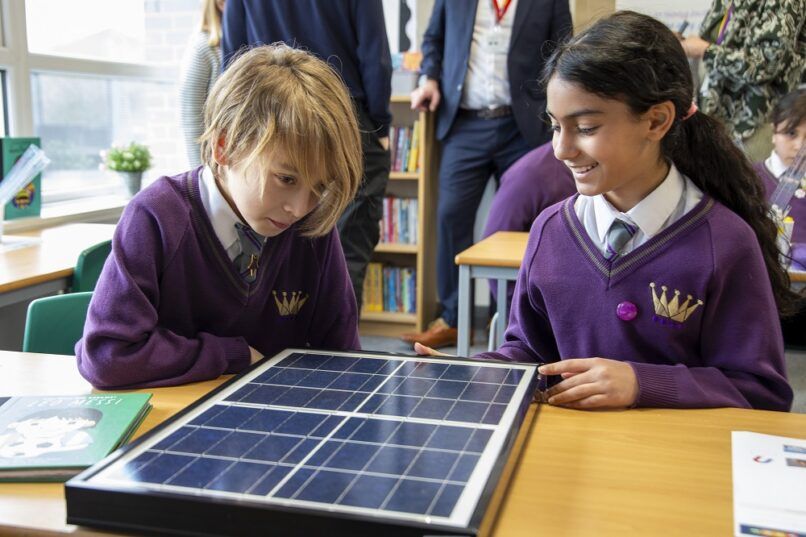
Across the country, businesses and organisations are now taking steps to transition to clean energy and green technology, reducing the UK’s reliance on fossil fuels and switching to low carbon options.
Like everyone else, schools have their part to play to cut their energy usage and find more environmentally friendly and sustainable ways to function and grow.
At Ark we have 39 schools in Birmingham, Hastings, London and Portsmouth – which means we have a lot to do to get ready for 2050. To achieve net zero in just 25 years, preparation now is absolutely key.
Getting started
We started greening our schools by looking at energy management. Condition surveys in all our schools helped us to prioritise where improvements and development were most urgently needed.
We investigated the integrity of our buildings and used solutions like installing double glazing and roof insulation to improve their energy efficiency.
Using our school capital funding, we set ourselves a target of replacing every lamp in every school with an LED installation. LEDs use up to 90 percent less energy than traditional lamps and can last up to 25,000 hours, significantly reducing the need for frequent lamp replacements. They also use less energy, so they help us to cut our carbon footprint.
We committed to installing photovoltaics (PVs) or solar panels on every suitable school roof to create clean and green solar energy directly from sunlight.
Supported by grants from the National Grid initiative to help schools in deprived areas, and working in partnership with Solar for Schools, we now have 27 schools with PVs.
Taking action
The next step was to install smart meters in each of our schools to track energy usage across the network.
This allowed us to collect real-time data in half hour chunks so we could create our own energy dashboards to monitor and pinpoint exactly how much energy was being used by a certain school over a particular period.
We quickly realised some of our schools were using more energy at times when children weren’t in school – which sounds counterintuitive, but school heating systems are controlled by building management systems that aren’t always as efficient as they can be.
We presented that information to schools and worked together to flip that dial. Making small changes to timing and temperature can make a big difference to overall energy consumption.

Getting results
With the help of our energy dashboards and artificial intelligence (AI), we now have a really detailed understanding of our schools’ energy usage, and we have monthly meetings to review our schools’ energy consumption.
We’ve also shown our commitment to cutting our energy usage by employing a full-time energy manager.
It is an ongoing process, but we’re currently running 14 percent under our gas and electricity consumption from the previous year to date.
And the other outcomes are all going in the right direction:
- Our energy reduction measures for electricity and gas have now saved the network over £300,000.
- We have saved a whopping 770 tonnes of CO2 by the actions we’ve taken over the year to date compared to last year – the equivalent of about 192 round-trip flights from London to New York per passenger, planting 12,700 trees and letting them grow for a decade or powering 100 homes for an entire year.
What happens next?
As a network, one of the next steps will be looking at how we deal with school waste to ensure that we meet our sustainability targets. A sustainability lead will be appointed by Ark in the near future. Their role will be to develop the curriculum to take into account sustainability and review our suppliers and contractors and their impact on the environment.
Once we finish installing LEDs and PVs our electricity demand will drop and reduce CO2 emissions.
Now we’ve done the groundwork, we are starting to look at specific energy reduction projects that will work for certain schools. For example, we are working with Portsmouth City Council to install a special swimming pool cover which will ensure heat remains in the water and reduce the amount of gas required to keep the water at a steady temperature.
Some of our schools are driving their own biodiversity projects – for example, Ark Tindal in Birmingham has developed its own science garden, and has an active gardening club and eco council. It would be good to replicate this work together network-wide.
We are still in the early stages of our journey, but we are pleased with the progress we’ve made so far. We are sharing our learnings with other MATs so that together we all work towards 2050 net zero.
Latest news and opinion
-
Opinion16th February 2026
Time to champion Art in education
-
News3rd February 2026
Pontefract Academies Trust and Ark Schools merger approved
-
Opinion12th January 2026
Why digital transformation must be a priority for schools in 2026